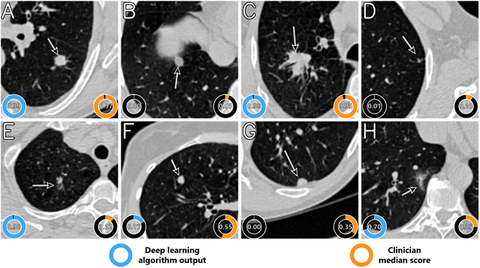
Background
Intrapulmonary lung nodules are focal abnormalities in the lungs that present potential early stage lung cancers. Computed tomography (CT) imaging is highly sensitive for the detection of lung nodules. The Dutch-Belgian NELSON trial among 15,000 participants followed for 10 years, recently showed that CT screening leads to 24% lung cancer mortality reduction in long-term male smokers. This positive result has sparked discussions on implementation of lung cancer screening in the Netherlands.
Pulmonary nodules are very common in the target population for screening with a prevalence ranging from 22% to 74%, depending on the inclusion criteria, CT parameters, and minimal size cut-off. The vast majority of these nodules are benign, but their presence may result in additional investigations to prove their benign nature.
Pulmonary nodules are also frequently detected on routine chest CT imaging, so-called incidental lung nodules. In 2015, a large study across a large hospital network in Southern California reported that incidental pulmonary nodules are an increasingly common finding in routine medical care, with an incidence that is much greater than recognized previously. In a recent study, we analyzed the data on CT examinations and reported lung nodules at two Dutch hospitals between 2008 and 2017. We found that the number of patients who underwent chest CT examinations substantially increased over the past decade, the proportion of patients in whom a pulmonary nodule was found increased, as did the percentage receiving CT. These findings underline that more effective nodule management becomes an increasingly important public health issue.
Problem description
The diagnostic challenge in both scenarios is to differentiate potential malignant nodules from the vast majority of benign nodules. This is currently done by using nodule size cut-offs and CT follow-up to determine persistence and growth of nodules over time. Clinical management rules published by several societies aim to standardize this process. However, CT follow-up of pulmonary nodules is often the only way to discriminate between stable benign nodules and growing nodules that are potentially malignant. This results in healthcare costs and causes emotional distress among adult patients.
Thus, there is a critical need for improved nodule risk stratification.
Research direction
We offer a fully-funded PhD position that focuses on improving the risk stratification of pulmonary nodules. Using novel artificial intelligence technology, we aim to improve the risk stratification of screen-detected and incidental lung nodules by 1) acceleration of the identification of malignant nodules, and 2) limiting unnecessary nodule workup for benign nodules. This position is part of a KWF project AMARA in which five hospitals in the Netherlands partner to tackle this problem.
This PhD position focuses on the use of novel AI algorithms. AI algorithms based on deep learning have great potential to perform more reproducible and more objective pattern recognition and thereby may increase the accuracy and consistency of malignancy probability estimation of pulmonary nodules. This increased accuracy can be used to develop optimized follow-up protocols, leading to less unnecessary follow-up CTs.
You will use previously developed AI algorithms developed and validated by our research group. In addition, a second PhD candidate with a more technical background will work on further optimization of these algorithms in collaboration with you. You will work in close collaboration with a team of technical PhD candidates, research software engineers, and radiologists. Your daily supervision will be performed by Colin Jacobs. Your PhD supervision team will also involve supervisors from the other sites.
The research should result in a Ph.D. thesis.
Requirements
For this project at the department of Medical Imaging at Radboud University Medical Center, Nijmegen (The Netherlands), we are seeking an enthusiastic PhD student with a clear interest in the potential that AI techniques may have in the field of radiology. This is an excellent opportunity to assess the value of this cutting-edge technology and investigate its potential to more personalized lung cancer care.
Tasks and responsibilities
Within this project you will:
- Learn about the strengths and weakness of AI algorithms in the domain of radiology
- Work together with AI researchers to improve the AI algorithms
- Validate the predictive power of AI algorithms for nodule risk stratification on several existing retrospective datasets collected from large screening trials
- Extend existing AI training data with incidental lung nodules from routine clinical practice and collect a retrospective validation dataset of incidental lung nodules at the five participating institutes
- Determine an optimized nodule management algorithm by including the AI risk score
Profile
You should be a creative and enthusiastic researcher with a MSc in a relevant field, such as medicine, technical medicine, clinical epidemiology, or similar. Interest in medical imaging, with a particular focus on oncologic (lung) imaging and artificial intelligence. Interest in and preferably experience with scientific research.
Organisation
The Diagnostic Image Analysis Group is a research group of the Department of Medical Imaging of the Radboud University Medical Center. We develop, validate and deploy novel AI algorithms in healthcare. This PhD position falls with the lung cancer image analysis research line led by Colin Jacobs. We actively collaborate with many international players in the field of lung cancer care, and have a strong focus on integration of our AI algorithms into clinical practice.
Terms of employment
Starting date is preferably June 1, 2022. The project will appoint a PhD candidate for 4 years in total. Your performance will be evaluated after 1 year. If the evaluation is positive, the contract will be extended by another 3 years. The gross monthly salary, depending on education, will be scale 10A or scale 10 based on a full-time working week (excl. vacation bonus and 8,3% end of year payments). Upon commencement of employment we require a certificate of conduct (Verklaring Omtrent het Gedrag, VOG) and there will be, depending on the type of job, a screening based on the provided cv. Radboud university medical center’s HR Department will apply for this certificate on your behalf. Read more about the Radboudumc employment conditions and what our International Office can do for you when moving to the Netherlands.
Application
Use this link to apply. Applications will be reviewed on an ongoing basis until the position is filled. For more information about the vacancy, please contact Colin Jacobs.


